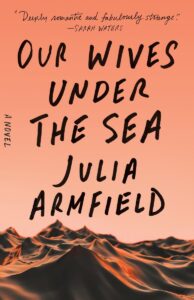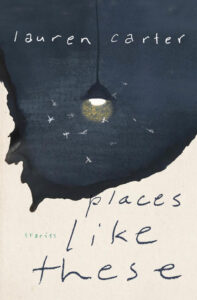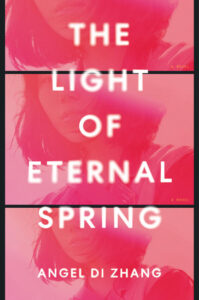May 17, 2023
Our Wives Under the Sea, by Julia Armfield
I am infinitely grateful to whoever it was who inspired me to put this on hold at the library. OUR WIVES UNDER THE SEA, by Julia Armfield, was incredible, blending literary elements with horror to create a spellbinding tale of love and loss. The point of view moves between Miri and her wife, Leah, a marine biologist whose routine research trip goes wrong when their submarine sinks and is lost to contact. Six months later, Leah comes home again, but something is very wrong and Miri is unable to reach her, or get answers about what happened in the deep, a story Leah tells piece by piece in her part of the narrative. This is a novel infatuated with the wonders of the world, oceans and love among them. Creepy and compelling at one, a strange inversion of THE SHAPE OF WATER, and definitely one for readers who loved Melissa Barbeau’s THE LUMINOUS SEA, or anyone into JAWS. What a story!
May 16, 2023
Gleanings
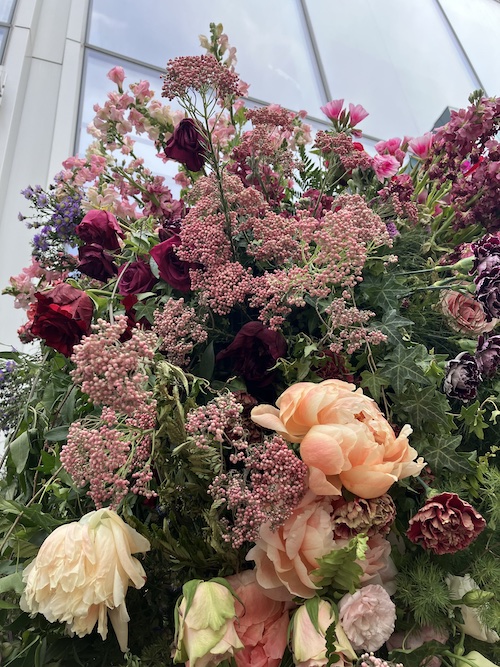
- Tranchese believes that the media’s frequent and unbalanced usage of alleged/allegedly since 2012 has subtly changed the way it’s interpreted.
- May is the month for memories and small moments, for topping up your joy tank.
- That’s a lot of energy to expend and baggage to unpack while I am just trying to eat my goddamned lunch in the one hour I have to myself in the workday.
- Fellowship Point is like a Barbara Taylor Bradford novel if it were written by Elizabeth Strout.
- Hers was a voice that made us want to do what she was doing.
- As I survey the landscape of my life, I can see that my fascination with symbols has deep roots. Tarot. Sigils. Witchcraft. Tattoos. Literary analysis and Coen Brothers movies.
- After such a long stretch working at my kitchen table, I’d forgotten what a commute can bring about, a shift in mindset, an unfurling of ideas, a transition.
- Up there, where someone has painted SCRIBE? That’s where I met the editors who published my first story in 1992.
- I don’t understand flight, I don’t know anything about velocity or lift or speed … but I do know there a is full moon on Friday and that it’s magical to look up and revel in the moon’s shining beauty while soaring high above the clouds, and that beauty is a worthwhile lens through which to view life.
- I think a lot about my boat of calm, and how I’ve had my moments where I was not calm. But I’ve also had a couple of deeply profound signs / interactions of late that tell me this might be one of the most important things I can do. And maybe a lot of appearing calm is acting? But because it’s a practice for me, a long one, I feel like my calm-acting has been worth something, too.
- The forest, it turns out, is an excellent teacher.
May 15, 2023
Places Like These, by Lauren Carter
“I never though something like that would happen in a place like this,” is the thing people always say in local newscasts in the aftermath of tragedy, as though there were actually places in the world that immune to life itself, to its terrible, tragic unfairness, and inexplicability (and isn’t this part of the same reason people travel, to escape all that?) but, as Lauren Carter shows in her fantastic new collection Places Like This, life happens everywhere, on rural highways, far flung suburbs, northern towns, and abandoned homes in the middle of nowhere. In the New York state spiritualist community famous for its mediums, a stuccoed church in Argentina, in the shadows of San Francisco’s Tenderloin neighbourhood (“Carol did not tell her how she’d envisioned a slab of raw beef, glaring a wet red before purpling like an aged bruise. The expensive cut, one her mother would have rarely purchased at the downtown butcher shop with the creaking wood floor, the dusty cans of corn niblets and cherry pie filling.” ).
These are stories of sadness and longing, of wanting but not getting, but this—of course—is also life itself, and the collection is less bleak than it sounds, because these are stories of characters building a home and a finding a world within its realities, of finding love, spots of light, connection and meaning. Even in “places like these,” rich stories are possible, such as that of the couple whose dog is saved as the narrator’s struggling stepbrother begins to slip away; a widow keeps seeing her late husband; a woman glimpses the depths of her partner’s sadness when she goes home to meet his family; the couple together but emotionally worlds apart as they grieve a pregnancy loss, which is also the loss of so much love and so many dreams. I especially loved the three final stories in the collection, linked narratives about a group of women who’ve been friends since high school whose own ties are fraught, complicated, and irrevocable.
These are tough stories, rugged and hard, but there are also gorgeous moments of connection, of illumination—I keep thinking of a description of a drink in a character’s hand, “a bowl of light.” There are stories that shine.
May 9, 2023
Reading Good
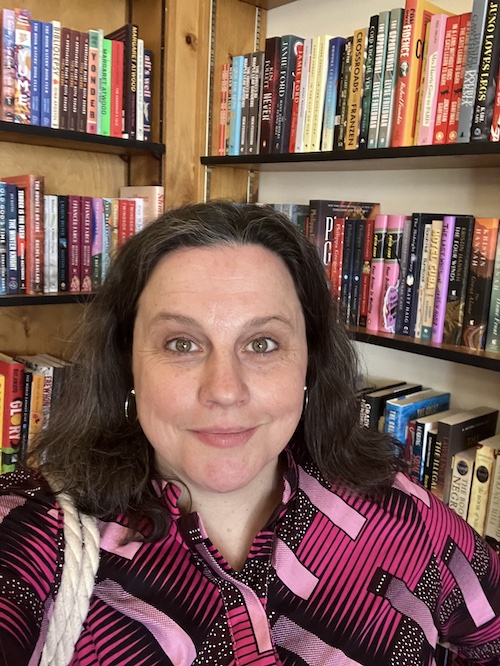
I’ve been trying to solve the mystery of why my reading life has been especially rich and fruitful in 2023. Like, rich and fruitful beyond my own usual very high standards of what constitutes a rich and fruitful reading life. Partly it’s quantitative—I’m currently reading my 75th book of the year, which is the most books I’ve ever read by this time of year since I started keeping track in 2018. And this is partly because I got my first iPhone in November, which charges from my laptop downstairs, which means that my phone is far from bed and almost never the first thing I reach for in the morning. On many days, I read instead, and those half-hours definitely add up to something. But part of the quantity is qualitative too, because it’s the release of wonderful absorbing novels that have kept me going, big releases from Eleanor Catton and Rebecca Makkai that more than lived up to the hype, and books I only picked up because of all the hype (Tomorrow and Tomorrow and Tomorrow, and Lessons in Chemistry) and I was so glad I did. But it’s not all been hype—I’ve loved rereading Elizabeth Strout’s back catalogue on the coattails of Lucy Barton, and picking up a 1990 short story collection by Joan Clark, and continuing to discover William Maxwell. Part of it is that I’ve found my own personal influencers, readers like Lindsay Hobbes and Lauren LeBlanc whose recommendations tend to satisfy. I’ve also been using the library more than I have in years, partly to keep up with the influencers I just mentioned without going bankrupt, taking months to finally get a book into my hands…but then I have to read it right away once I do because there’s more holds behind me and it can’t be renewed (this is the situation with Aleksandar Hemon’s The World and All That It Holds, which I’m reading right now upon the recommendation of my friend Julia). I don’t feel overwhelmed by all that I still need to read, or all I’m never going to read, or all the books that other people are reading, because I feel confident in my own personal reading trajectory (and glad too that it’s not just made up of all the things that I’m being told to read, or that everybody else is reading so I’ve got to do it too.) I think part of the richness and fruitfulness is also that I, for the first time in a really, really long time—like maybe even a decade?—am feeling relatively steady on the ever-shifting ground of reality, and I’m not even afraid to say that for fear that reality is going to come now and knock me over, tempting fate. I’m feeling good, and so I’m reading good, which is a sentence I’m going to leave right there, never mind the grammatical atrocities being committed. But then, as I always wonder, could it be instead that I’m reading good so I’m feeling good? (Certainly, for me, a poor reading streak and feeling terribly have often coincided.) Which comes first? How does one ever know, or begin to untangle it all? This is one of those existential questions that, it’s likely, I will never understand.
May 2, 2023
The Light of Eternal Spring, by Angel Di Zhang
“My mother died of a broken heart, or so the letter said.”
And this is the spectacular opening line of Angel Di Zhang’s dazzlingly dreamy debut novel, The Light of Eternal Spring, a story of love and loss, a story of finding and belonging, about seeing and knowing, all the gaps between what we remember and what really happened, and the curious nature of space and time. How did we get from there to here?—a question that preoccupies Di Zhang’s protagonist, Aimee (pronounced Eye-Me), particularly after her mother dies and she travels with her American husband back to her hometown in China, the rural village of Eternal Spring, where she hasn’t been for so many years. It’s also the question the narrative sets out to answer.
Aimee, a photographer, is known as Amy in her new life in New York City, where she is now so established that she thinks in English, and her photos appear in ads on the subway, and she thinks her thoughts first in English instead of her native Mandarin. Though it’s Manchu that’s Aimee’s mother tongue—literally, her mother’s first language—and she’s forgotten it to the point when her sister’s letter arrives with news of her mother’s death, she has to have it translated by a woman in Manhattan’s Chinatown running a vegetable stall.
It’s 1999 and communication is not as instantaneous as it is today. When Aimee and her husband David set out for Eternal Spring in the hope of making it back in time for her mother’s funeral, she has no idea what to expect, and her family don’t even know to expect her. What she’ll find is a place and people who are radically different than they were when she last saw then, by virtue of the nature of memory, but also because the previous decade has been a time to radical change in the village, which has become busy and bustling, not a village at all. Because nothing ever stays fixed, both in life, and in our memories, and such understanding is a challenge for Aimee, whose photos aim to capture time, to hold it still.
How to grapple with the mutability of reality? And even more important, how to resolve her relationship with her mother now that her mother is gone? The last time mother and daughter were together led to a spectacular flame-out and they haven’t spoken since. Will there be any chance for Aimee to to reconcile with her mother’s memory? And what about reconciling the space between Aimee and Amy, between the place where she comes from and where she lives now, and possibility of belonging to both places, a kind of double exposure, not a photographic error but instead an accurate image of her psychic reality?
I loved this book, its freshness and sense of play, its curious placement outside of time, just beyond the limits of realism, about the all the possibilities of impossible things.
May 2, 2023
Gleanings
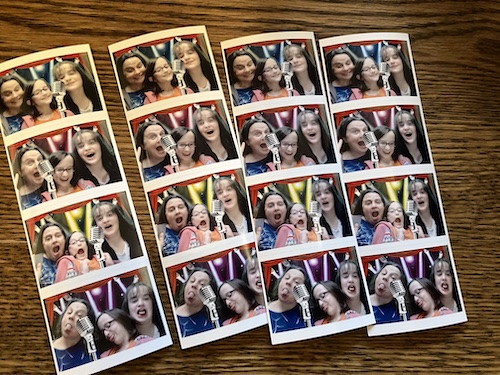
- It’s no picnic, that’s for sure: the unexamined life may not be worth living, but (as I have often thought myself in recent months) surely in many ways it is an easier way to live.
- Blue Portugal & Other Essays is a book I’ve been writing all my life, through all the years that have led to this one, stitched from scraps of beauty and difficulty and love.
- The year is now 2023. Books have been published. Regimes have changed. Children have entered and nearly completed middle school, gray hairs have sprung, betraying, and I believe — I mean, I’m absolutely utterly certain — that this is the final iteration of what I consider to be the perfect homemade hash brown patty….
- What is the relationship between nature and each of these walkers? Is there a melding of purpose and experience, a common recompense on some level? Have any of them met the soul walking upon the path? How aware is each walker, of just how interconnected they are to this woodland? In the simplest of terms, the trees give off the oxygen we breathe in, and absorb the carbon dioxide we exhale – a true symbiotic partnership that has spanned centuries.
- It is what my brain has been like this month. Just flayed, spread out and incapable. (looks like a flower, but carries a whole lot of teeth) while my body does all the things necessary: kids are mostly fed, laundry is done and even folded, sports are attended, jobs are attended, my brain has been uninvolved.
- I share my words with you. You provide me with your thoughts and wisdom. I sit with your words. And I am rewarded with more learning, insights, and additional pieces to the puzzle.
- Do I recommend it? Only if you enter into the experience of reading it with a sense of generosity and curiosity, as if you’re conducting an experiment. Which, come to think of it, isn’t a bad way to begin reading any book: with generosity and curiosity.
- For me, fourteen years ago when I was desperate to move on from the thing that had consumed my energy for almost a year, meeting an active, healthy person who had done the treatment and gone on to live a good life, inspired me. My hope is that my story in some way inspired them. They certainly inspired me. Out there playing pickleball when they’re still dealing with pulling gauze out of their chest. Now that’s impressive!
- I am sad to report that I have exhausted all of the available fiction by Iona Datt Sharma. But I am overjoyed to have found them in the first place.
- All day, it was like looking through a small microscope, a zoomed in experience of the world. Seeing just a piece, a small part of all of this, of all of us.
May 1, 2023
Harper Valley PTA
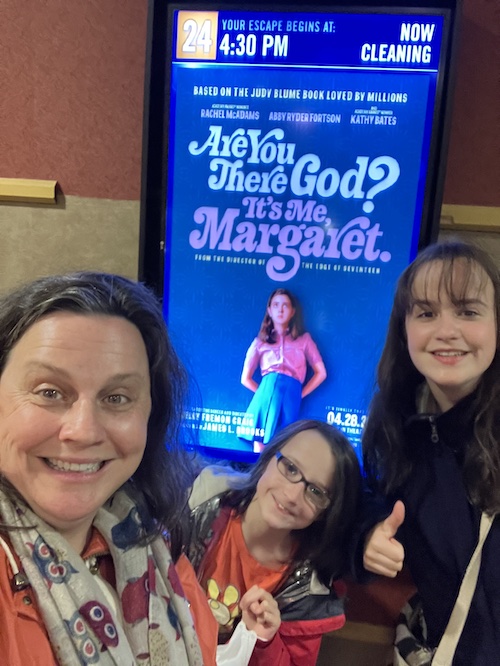
I had but a single reservation about the film version of Are You There God? It’s Me, Margaret, which I saw at the cinema yesterday with my daughters whose companionship for such an occasion was such a treat for me. They’ve both read (or reread) the book in the last few weeks, and were as enthusiastic about the movie as I was. We loved it, and to all be able to experience and love something together is a pleasure I appreciate so very much.
But. But. But.
And this is personal. I’ve spent the last few weeks overwhelmed by several things, not the least of which is a fundraiser for my child’s school that has ended up on my plate mostly because I was the only person who reluctantly failed to refuse it. Because I cannot bear to leave a silence or vacuum unfilled. Because while succeeding in leaving such a silence or vacuum unfilled is an act of liberation (which I’ve even managed to pull off once or twice) it only means that someone else is going to have to do it, and that’s not really liberating at all.
It’s a quandary, and I’ve come full circle, and then some. When my children started elementary school (ten years ago!), I swore off volunteering altogether…because I know myself, how it’s only ever all or nothing, and um, I think I was also still on the board of their playschool at the time. And I was also bowled over by the requests for volunteers and funds (and usually both) at my children’s school. It was too much, it was inequitable, they had galas to raise money for the galas! Okay, that last point is an exaggeration, but I put it in my first novel, Mitzi Bytes, whose protagonist was resolutely anti-school volunteering. She values her time too much to go in for any of that nonsense—and oh, I wish I was her with every fibre of my being. The way she really doesn’t care what anybody thinks or about what she should be doing. She’s not doing it, and it’s simple. What I would give for that kind of clarity.
But of course, I care what people think a lot, too much, and I overthink everything about how to be a good citizen, and a good community member (and how to be “good” in general, which my therapist and I will be continuing to unpack for the foreseeable future), and so when my book was coming out, I eagerly signed up for the school council just so now one would think that the book was autobiographical, and chaired that council for two years, taking on duties to such a ridiculous extent that I was sitting in for the secretary sometimes when I was chairing, taking my own minutes, which is nuts. I also thought a lot about the role of fundraising in public education, registering my discomfort, but by this point understanding how school staff count on these funds, which are raised entirely on the backs of moms whose labour is discounted by assholes like my protagonist and other like-minded folks (who were sometimes me).
I managed to step away from school volunteering eventually, which maybe is the way it should be—we do what we can, take a break, come back again (or not). These days I volunteer twice a month at pizza lunch, which I really like doing, and it’s nicely low key. I’m not on school council anymore, because I did my time. It’s other people’s turn—and that’s a wonderful thing to realize, by the way, when we’re feeling all disgruntled, put-upon, why do I have to do everything? When I stopped showing up, someone else took my place, which is also (sort of) to say that I gave someone else a chance to take my place (as opposed to taking my own minutes; all or nothing, remember?).
But then my elder daughter entered middle school, and it’s very small school, oh no, I saw it coming, really. This spring fundraiser that hadn’t been produced since 2019—who was going to do it. It was going to be me. It was always going to be me, even though I’m not really that good at producing events, and I do so always in the most corner-cutting, simple way possible because I’d rather get it done than do it well. Sigh.
And, truthfully, it’s not been so bad, and I’ve only cried about it once, and if the event manages to be a success (it’s the day after tomorrow), which is to say even approaches reaching our fundraising goal, I’ll be glad I did it. Even though I’ve been bothered that more people in our school community haven’t been pitching in, that such a small number of parents (moms!) are usually the ones who do everything, and so many others are content just to not be involved, to ignore my emails, to not respond to requests for help, content to let it all be somebody else’s burden, which is to say mine.
I think what bothers me so much about the situation is not just that people aren’t helping, but that their failures to help makes me feel embarrassed, ashamed. Sending out these annoying emails week after week, all peppy, and knowing such messages must be so obnoxious to receive, so I feel kind of pathetic, like a loser. And that it seems like I have nothing better to do with my time than this—what does that say about me? About who I am and what I do?
(Like I said, this is personal.)
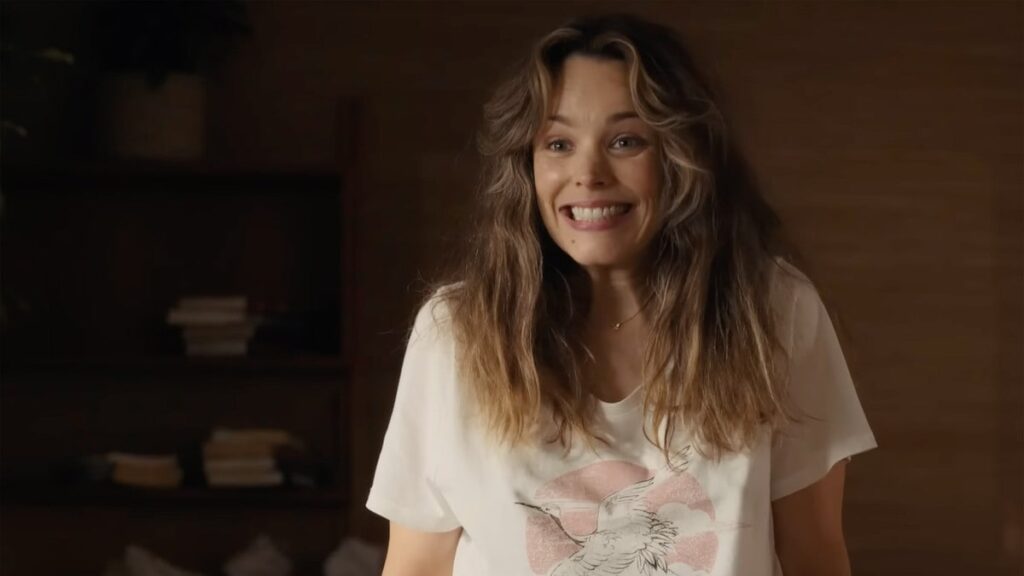
So yes, I was conflicted about the final arc of Rachel McAdams’ character in Are You There…, a bohemian mom who moves to the suburbs and leaps right into the school community because she wants to do the right thing and because for the first time in her life she has the time to, but of course her intelligence and talents are wasted there. The company is terrible, shallow, and the labour itself is totally pointless—she’s charged with cutting out thousands of thousands of felt stars that ultimately end up on the garbage. By the end of the film, she has found better and fulfilling things do with her time, and when she’s called on again to volunteer, she declines, declaring “Because I don’t want to,” and people in the cinema cheered, and I get that, but I also hate that.
In particular during this particular week, as I find myself (metaphorically) cutting out my own felt stars, as I send just one more cheery email urging families to please sign up for the bake sale.
What do we do with this? What do we do with the vital labour of mothers that’s necessity to make up for a public education system that has been hopelessly underfunded for nearly thirty years? What do we do with the fact that it’s often other mothers who are most derisive about this labour? And what do we do that none of this ever has anything to do with the dads at all? (And we can continue—this is about class, of course. About families with the time and resources to commit to school fundraising, which many school communities can’t count on at all.)
These are the circles I’ve been thinking in for almost a decade.
But today I came to some kind of answer, or the beginning of one—at least in my own mind. First, we need schools better funded. We need fathers to be as invested as mothers are in what happens at school, which means less work for everyone. And another part of the answer, which I’ve sort of been onto already, by virtue of being lazy, is my corner cutting approach to things all along. I’m not cutting out any fucking felt stars, is what I mean. This kind of labour is essential, so use it smartly, use it well. Value people’s time. Keep meetings within limits. Respect people’s boundaries. Appreciate people’s talents and skills. Don’t take any of this for granted. And if everyone does a little, that means no one has to do it all.
April 26, 2023
AFAF Mood Board: Part Two
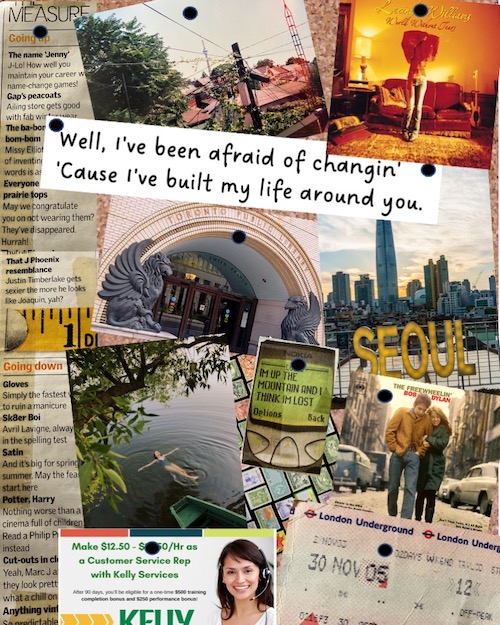
Mood Board 2 for Asking for a Friend, my new novel coming from Doubleday Canada on September 5! These images are inspired by the novel’s third and fourth chapters in which Jess and Clara begin to make their respective ways in the world after having lived a life entwined throughout their early 20s. How are they supposed to be themselves without each other?
Asking for a Friend is available for pre-order from your favourite bookseller!
April 25, 2023
Gleanings
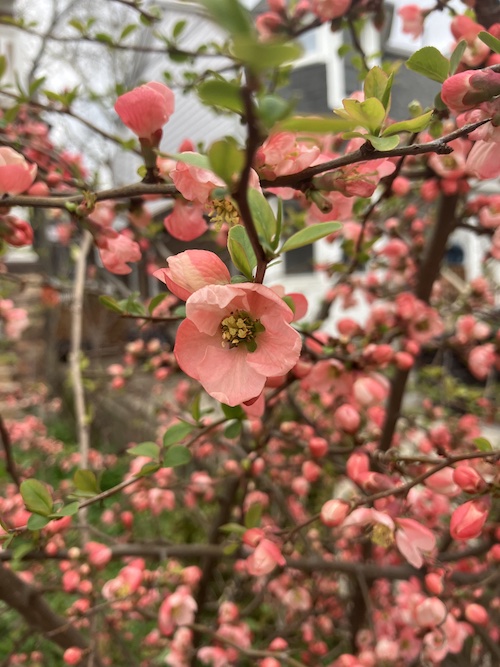
- I’ve previously shared with you that grief is my roommate, inescapable even when I’d rather live alone. In that moment in my basement though, I realized that my emotional house-mate had, in recent months, quietly moved to the lower level.
- The largess of Andrew Carnegie allowed for the construction of five libraries here in Essex County, and the one in Windsor was the first Carnegie Public Library in Canada.
- But this book, and Sashi’s brothers and friends who kept disappearing from the village, brought back not only the memory of that young man who disappeared from our office, but also the realization how war is never just black and white, never just good versus evil, never only the one narrative we hear. Because we never truly know how the everyday lives of people are forever changed and often erased.
- From author Deryn Collier comes a smart, charming postwar historical novel based on the true story of an aspiring writer who dares to dream big.
- For me, I decided to make a deal with the world. The deal is that I agree to believe everyone is trying their best, and I hope that they will believe I’m trying my best. No conditions. That’s the deal.
- Burr falls squarely in the tradition of The Southern Ontario Gothic, mining the unsettling territory where our wilder, more honest selves rub up against the veneer of suburban respectability that blankets us. It reminds me of the novels I read as a teenager just beginning to discover what literature could do, books by Margaret Atwood and Alice Munro that offered me the radical notion that the boring, bright suburban world I inhabited was as full of ghosts and desire and grief and decay as any other time and place.
- 7. I wonder if she even liked the dishes? If they ever got used? If the dress felt good on her body?
- And now I am being careful about what I wish for. Warmer days, yes, but not too hot (the ability of bees to both pollinate and to reproduce decreases in extreme heat). Nights without frost. The third planting of tomato seeds (better late than never?) growing to full size, heavy with fruit, the pans of them roasting with garlic, rosemary, quarters of onions, the beautiful mutilated world somehow surviving, surviving us.
- After much reflection, I’m now learning that the confidence, daring and joie du vivre that I felt in my Mum throughout my childhood was in part the result of a woman who didn’t compare herself, and didn’t bother too much with what others thought. She was herself, not a version she aspired to.
- Last night as I turned off lights and tucked kids into bed, I caught a whiff of lilacs. A neighbor’s lilac bush was blowing its heady perfume three doors over and two stories up, right into our windows. The evening air had grown chilly and the sky was not quite dark, so I closed the windows and drew the shades and thanked goodness for the millionth time that winter is over and that tomorrow could bring more lilac huffing.
April 24, 2023
There Was a Good Man Named Paul Revere
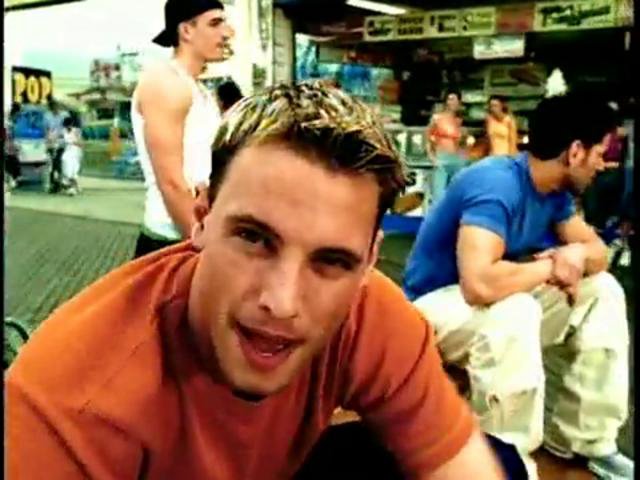
On Friday evening, a raccoon got into my kitchen. (Not for the first time; also this was not the only raccoon intruder in the neighbourhood this weekend!). And whenever I told anyone about it, they’d ask how the raccoon got in, and I would reply, “It came in the door…” And then I’d have to resist the impulse to finish off the sentence with, “I said it before/ I think I’m over you, but I’m really not sure.” Which is a problem much more rare than Toronto raccoons are, which is that I am absolutely obsessed with the song “Summer Girls,” by LFO.
And the weird thing about this is that everyone else isn’t. I don’t get it. A few years ago, back when Twitter was not a terrible place, I shared my shocking discovery that two out of the three members of LFO (aka, “The Lyte Funky Ones,” whose “Summer Girls” was pretty much a one-hit-wonder in 1999, though they tried hard to follow it up) had died of cancer. Because what kind of a statistic is that? Cancer, robbing the world of 66% of the ones who were lyte and funky, and now there is just one. The Lyte Funky ONE, and I partook in such banter with exactly TWO people, and it seemed like nobody else on Twitter cared about LFO, or even remembered the song at all.
But the lyrics to that song are wired to my brain in a way that I just can’t kick, and I don’t even want to. Which is kind of ridiculous, because the lyrics are so random and weird, but unbelievably catchy, and I just can’t help walking around the house muttering lines like, “Call you up, but what’s the use?/ I like Kevin Bacon, but I hate Footloose.”
Part of the problem is that I have two amazing daughters, and so it comes up a lot, a line like, “You’re the best girl that I ever did see.” Multiple times a day, I’m not even kidding, to which my children reply, without missing a beat, “The great Larry Bird, Jersey 33!” And HOW can I not follow that up with, “When you take a sip, you buzz like a hornet, Billy Shakespeare wrote a whole lot of sonnets”? Not a single one of which I can recite, by the way, and yet I know all the words to this bizarre and remarkably song in which “hornet” and “sonnet” rhyme!
When I do online yoga classes, I’m sometimes instructed to “shake and wiggle,” which puts “Summer Girls” back in my head yet again...as if it even needed planting: “In the summertime, girls got it goin’ on/ Shake and wiggle to a hip hop song.”
And I don’t know a better expression of love than telling somebody, “There was a good man named Paul Revere/ I feel much better, baby, when you’re near.”
Stayed all summer, then went back home
Macaulay Culkin wasn’t home alone
Fell deep in love, but now we ain’t speakin’
Michael J. Fox was Alex P. Keaton
I honestly don’t understand why any other song has to exist!
I am not the only person who has thought quite extensively about this song, and Rob Harvilla “How ‘Summer Girls’ Explains a Bunch of Hits—and the Music of 1999” was such a joy to encounter, explaining a lot about just how this song has been running through my brain for almost 25 years. (The summer of 1999 was one of the most vivid and insane periods of my life, and I remember every song that was ever on the radio, which was this one, and “I Want it That Way,” by the Backstreet Boys, and “Living’ La Vida Loca,” and “If You Had My Love,” my Jennifer Lopez, and and and, and Harvilla does a formidable job summing up the absolutely bananas musical year that ’99 was.)
I had never heard of Abercrombie and Fitch until that song, whose video had a similar vibe to “Steal My Sunshine,” by Len, and we all watched videos then, and I put my hair in cute pigtails and wore tank tops and aspired to be admired by boys with frosted tips.
One day I’m going to be old and senile, and just repeating these lyrics on a loop.
Boogaloo Shrimp and pogo sticks
My mind takes me back there oh so quick..
